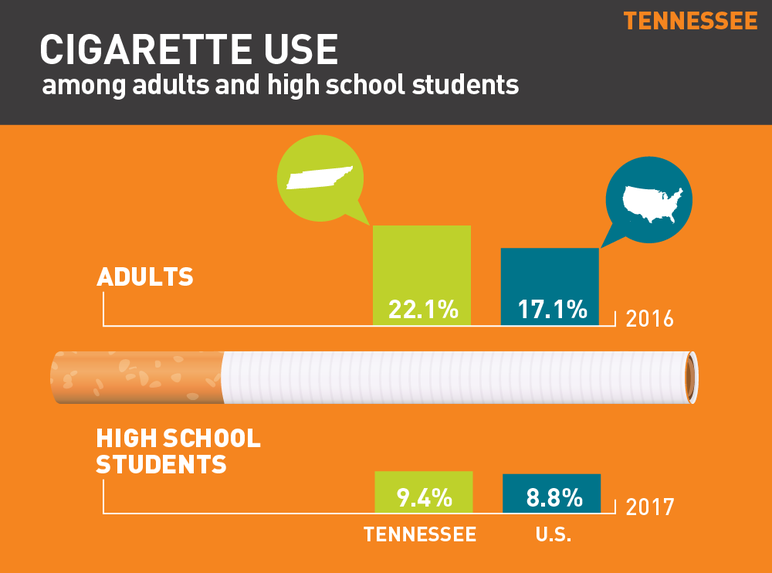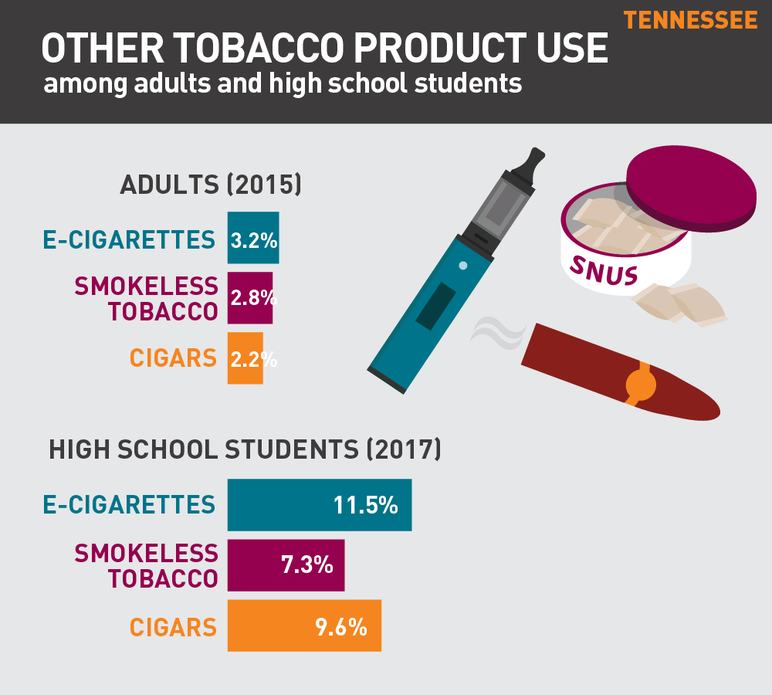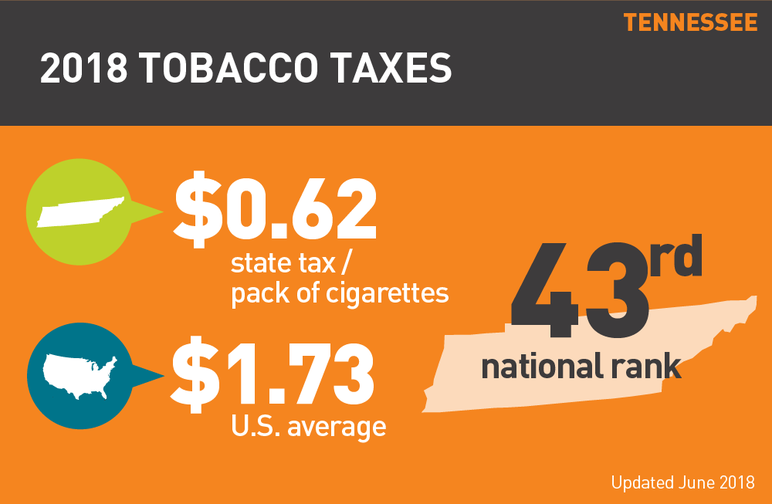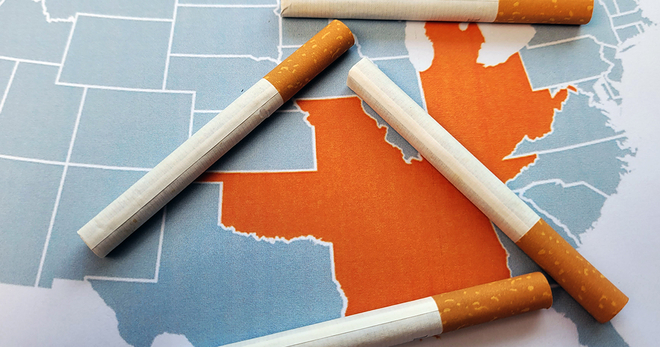Tobacco use in Tennessee 2018

Cigarette use: Tennessee*
- In 2016, 22.1 percent of adults smoked. Nationally, the rate was 17.1 percent.¹
- In 2017, 9.4 percent of high school students smoked on at least one day in the past 30 days. Nationally, the rate was 8.8 percent.²
Other tobacco product use: Tennessee
- In 2015, 3.2 percent of adults used e-cigarettes, 2.8 percent used smokeless tobacco and 2.2 percent smoked cigars.³
- In 2017, 11.5 percent of high school students used e-cigarettes, 7.3 percent used smokeless tobacco and 9.6 percent smoked cigars on at least one day in the past 30 days. Nationally, the rates were 13.2 percent, 5.5 percent and 8.0 percent, respectively.²

Economics of tobacco use and tobacco control
- Tennessee received $428.7 million (estimated) in tobacco settlement payments and taxes in fiscal year 2018.⁴
- Of this, the state allocated $6.2 million in state funds to tobacco prevention in fiscal year 2018, just 8.2 percent of the Centers for Disease Control and Prevention’s annual spending target.⁴
- Smoking-caused health care costs: $2.67 billion per year⁴
- Smoking-caused losses in productivity: $3.59 billion per year⁵
Tennessee tobacco laws
Tobacco taxes

- Tennessee is ranked 43rd in the U.S. for its cigarette tax of 62 cents per pack (enacted July 2007), compared to the national average of $1.73. (Connecticut and New York have the highest tax at $4.35 and Missouri has the lowest at 17 cents.)⁶ ⁷ ⁸
- All other tobacco products are taxed at 6.6 percent of the wholesale price.⁶ ⁷
Clean indoor air ordinances
- Smoking is prohibited in government workplaces, private workplaces (non-public workplaces with three or fewer employees exempt), schools, childcare facilities, retail stores and recreational/cultural facilities.⁶ ⁷
- Smoking is allowed in restaurants and bars that do not allow persons under age 21 to enter at any time.⁶ ⁷
Youth access laws
- The minimum age of sale for tobacco products in Tennessee is 18.⁷
- Minors are prohibited from buying bidis and e-cigarettes.⁶
- Establishments are required to post signs stating that sales to minors are prohibited.⁶
Quitting statistics and benefits
- The CDC estimates that 49.9 percent of daily adult smokers in Tennessee quit smoking for one or more days in 2016.⁹
- In 2014, the Affordable Care Act required that Medicaid programs cover quit medications.⁷**
- Tennessee’s state quit line invests 43 cents per smoker, compared to the national average of $2.10.⁷
- Tennessee does not have a private insurance mandate provision for quitting tobacco.⁷
Notes and references
Updated June 2018
* National and state-level prevalence numbers reflect the most recent data available. This may differ across state fact sheets.
** The seven recommended cessation medications are NRT gum, NRT patch, NRT nasal spray, NRT inhaler, NRT lozenge, Varenicline (Chantix) and Bupropion (Zyban). Fiore MC, et al. Treating Tobacco Use and Dependence: 2008 Update. Clinical Practice Guideline. Rockville, MD: US Department of Health and Human Services. Public Health Service: May 2008.
- CDC, Behavioral Risk Factor Surveillance System, 2016.
- CDC, Youth Risk Behavior Surveillance System, 2017.
- CDC, State-Specific Prevalence of Tobacco Product Use Among Adults - United States, 2014-2015, MMWR.
- Campaign for Tobacco-Free Kids, Broken Promises to Our Children: a State-by-State Look at the 1998 State Tobacco Settlement 19 Years Later FY2018, 2017.
- Campaign for Tobacco-Free Kids, Toll of Tobacco in the United States, 2018.
- American Lung Association, SLATI State Reports, 2017.
- American Lung Association, State of Tobacco Control, 2018.
- Campaign for Tobacco-Free Kids, State Cigarette Excise Tax Rates & Rankings, 2018.
- CDC, Behavioral Risk Factor Surveillance System, State Tobacco Activities Tracking and Evaluation System, 2016.
More in smoking by region
Want support quitting? Join EX Program
By clicking JOIN, you agree to the Terms, Text Message Terms and Privacy Policy.
Msg&Data rates may apply; msgs are automated.

